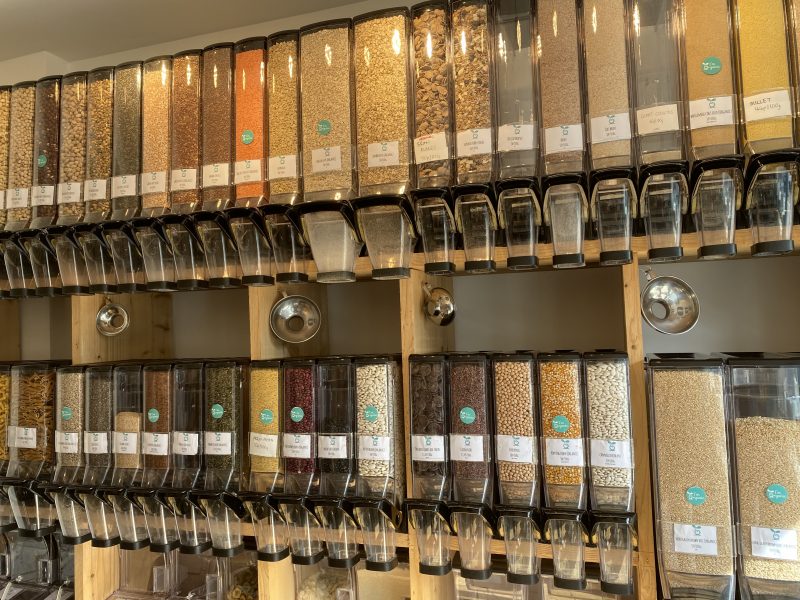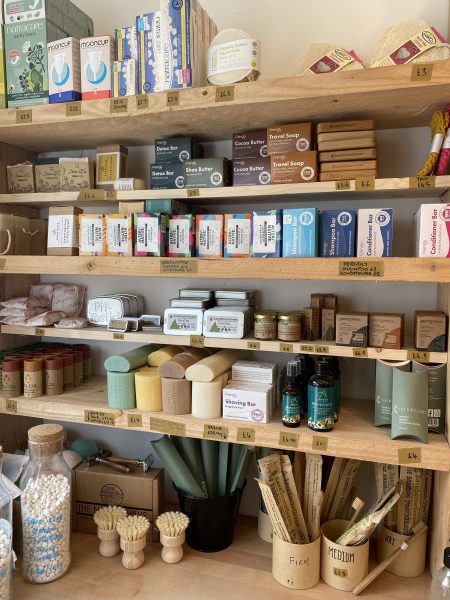Make haste with zero waste

Lifestyle Editor Millie Betts interviews Sarah Martin, founder of Nourish, to gain an insight into the process of shopping zero waste
Plastic pollution, in particular, has become a prevalent topic of discussion within recent years as people are more aware of the damaging effects it has on the environment. One main source of excess plastic is supermarkets, evident through 2019 statistics which show that they produced 896,853 tonnes of plastic packaging. While this is a slight decrease from previous years, it is still an extremely concerning amount. We hear of plans to reduce plastic in the future, but actions ultimately speak louder than words.
For Sarah Martin, the excess of plastic produced by supermarkets inspired her to open Nourish, her own zero waste store. I came across the shop on my daily walk to the Quay and became instantly intrigued, so I decided to try it out.
The variety of goods available in Nourish (all of which are listed on the website) was actually one of the most impressing aspects of the store. Just to name a few, the food products included: rice, pasta, granola, oats, sweets, and spices. However, it doesn’t just end there; the store also provides sustainable cutlery options, cleaning products, shampoos and conditioners, mouthwash tablets, toothpaste, and even sunglasses. Overall, my experience was great. I took my own containers, filled them up, and spoke with the friendly staff along the way.

There is a common misconception that zero waste stores are expensive, but many people (myself included) are actually pleasantly surprised when they receive the bill at the end of their shop. In fact, seeds, spices, and washing detergents are cheaper than what you might buy off the supermarket shelves. Sarah explained that if certain items, such as nuts for example, are slightly more expensive, it is because they are ethically sourced. Importantly, the products instore are from ethical wholesalers whose supply chains don’t use slave trade. The extra money you might spend on certain goods ensures that the people producing the products are being treated morally.
Notably, along with being morally sourced, the products sold instore are also obtained as sustainably as possible. Most of the goods are purchased in 25kg paper bags. However, some of the dried fruits can’t be delivered in this way as it leaks through the paper. In this case, they arrive in a bag in a box, a thin plastic bag inside a carboard box. Sarah has personally worked closely with the UK leading recycling centre in Exeter so that she can be mindful of the materials that can be recycled. Those that can’t be recycled are sent to a power plant–admittedly not ideal, but better than being sent to landfill. Everything is done in an attempt to make more circular systems.
The Exeter community are working together in an attempt to reduce waste. Currently, Nourish uses local businesses, like Exe Coffee Roasters and No.1 Coffee, to supply products. The coffee arrives at the store in plastic tubs, it is stocked in-store, and the original containers are sent back to be re-used. Instead of five bags of coffee, it can be supplied in one 5kg tub which is then re-filled.
Clearly, the smaller local businesses are collectively working towards improving sustainability (just one reason that you should be supporting them)! It just shows how simple changes, like starting to shop at sustainable stores, can better the environment.
It is safe to say that many students, and young people in general, are more conscious of environmental issues such as climate change. However, when looking to combat it, many are hesitant to extend their lifestyle changes by shopping at zero waste stores. Often, people form their own judgements without even trying these shops, possibly because they are intimidated by the idea. As Sarah humorously puts it, many people feel they have to “crotchet their own flip flops”, or they believe that these shops are too “hippie”. However, she wanted to emphasize that this isn’t necessarily the case. Instead, there is no judgement in her store.
Sarah states that “it would be great if we could all do it perfectly, but that’s not the world we live in. I would rather have 1000 people doing it imperfectly, making small changes”.
It would be great if we could all do it perfectly, but that’s not the world we live in. I would rather have 1000 people doing it imperfectly, making small changes.
Sarah Martin, founder of Nourish
For example, you won’t be lectured about the pots your using. People might feel conscious about using their plastic food containers, but she always notes that they are still producing less waste (as long as they are used multiple times). But, at the same time, remember that anything can be recycled: old yoghurt pots, used wine bottles, and glass jars. People need to remember that their kitchens don’t have to look Instagram-worthy!
It might seem like the small changes (changing your water bottle or using non-plastic straws) are futile when there is a huge climate crisis, and this might make people feel powerless. However, Sarah emphasises that we need to consider that “this is a gateway drug”. Transport and carbon emissions from the production of goods also need to be considered; you might choose to purchase wine from a bag in a box, meaning there’s still plastic involved, but the emissions released during production are less than those produced when making the glass bottles used in the supermarkets. As Sarah suggests, ultimately “there’s no point being puritanical about plastic if the oceans are dead because they have warmed up anyway”.
There’s no point being puritanical about plastic if the oceans have warmed up anyway.
Sarah Martin, founder of Nourish
It really can be as simple as bulk cooking food and freezing it instead of purchasing a plastic packaged ready meal, or buying individual fruits and vegetables instead of pre-packaged salads. It is so important to educate ourselves so we can break down the prejudices of living this way. Just give it a go and remember that it’s okay to make mistakes!
So, in the words of the Nourish team, “Join the movement @NourishZeroWaste” on Facebook, or follow the company on Twitter and Instagram!


